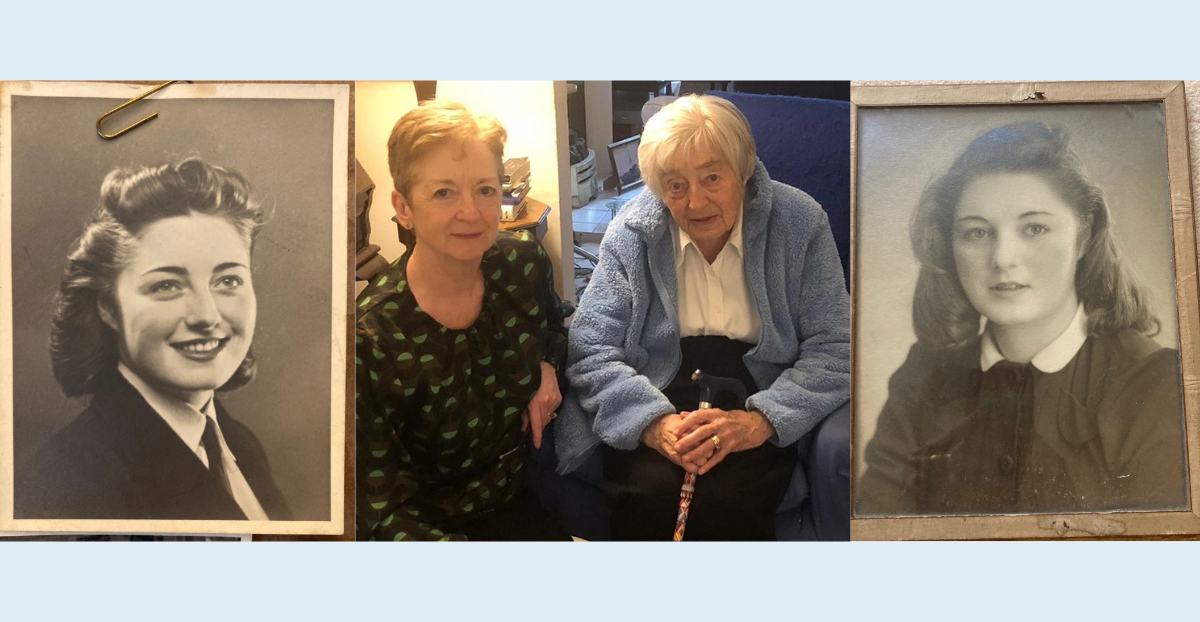DHA in 1941: Our Oldest Former Colleague Remembers
At the end of 2024, Caroline Walsh and Orli Vogt-Vincent had the opportunity to interview Patricia Davies, who we believe is the oldest living former employee of DHA. We were thrilled to be able to ask Pat about her experiences of the agency in its early years (then known as Pearn, Pollinger and Higham). Since the interview, we have been reflecting on how different the experience of assisting agents must have been in the 1940s, versus the 2020s.
Pat worked as a secretary at the agency in 1941, during the Second World War. At this time, the agency would have been six years old, having been set up in 1935 after Nancy Pearn, Laurence Pollinger and David Higham left Curtis Brown to set up on their own. Pat had completed a course at secretarial college, and knowing that she read quite a lot, the college found her a job at Pearn, Pollinger and Higham. She started working there aged seventeen on 18th June 1941. The office was then in Maiden Lane, and Pat fondly remembered walking across Hyde Park to get there, and seeing squirrels on the way. DHA now has its offices in Soho, a twenty-minute walk from the old offices. Though assistants might still pass a squirrel or two if they’re lucky, they are more likely to walk down a busy and bustling Oxford Street to get to work. Our assistants have rarely done secretarial courses and instead come from a rich variety of backgrounds and degrees.
Pat remembered her time at the agency fondly, having enjoyed working there very much. She remembered that David Higham, in particular, had been a very nice man – slightly less ‘grand’ than the others. While our assistants would never have met the man himself, David Higham’s memoir has a treasured spot on our shelves, the cover for which showcases Higham’s impressive facial hair!
Pat recounted stories of the strange glamours of the job: she was regularly sent to the Ritz with messages for the American correspondents who stayed there during the war, and met clients such as the Sitwells and Dorothy L. Sayers. She recounted that one made sure to be on one’s ‘best behaviour’ with the Sitwells, and remembered that she was particularly in awe of Edith. She also recounted that Dorothy L. Sayers regularly used the office to interview prospective housemaids! Pat would bring cups of coffee to her, and to her interviewees. While none of our assistants have experienced an author use our offices to interview housemaids (!), all have wonderful stories of the authors we are lucky enough to support. From attending exciting screenings to celebrate film adaptations of authors’ work, to raising a glass at book launches, to seeing their own names for the first time in the Acknowledgements of a book they have worked hard on behind the scenes, it is the close relationships we forge with our authors which leaves a particularly lasting impact.
Pat had moved to London to take up the job, which was no mean feat during the war. She remembered that the air always smelled of smoke and dust, and that devastation was seen all over the city – it was a dangerous time. She remembered an amusing anecdote about her frustrations with wartime regulations, which meant she had to trim the edges of the agency’s notepaper to make them regulation-size. She got very fed up with this.
Pat would eventually leave the agency as she had to have an operation, and would later join the Wrens when she was old enough. She knew German as they had a cook at home who was a Viennese refugee. She remembered that the Second World War truly changed her opportunities in life – thanks to the war, she was able to go to university. She studied at St. Andrews, then Somerville College, Oxford, and then completed an exchange year at Harvard, as well as a course at the Sorbonne. Prior to the war, girls were expected simply to do secretarial courses and then get married to suitable men. Reflecting on this, Pat told us proudly: nothing like that happened with me!
It was such a special afternoon speaking with Pat about her experiences over tea and cake, and we are very grateful to Pat for taking the time to fill in some more of DHA’s long history. It prompted many an interesting conversation in the office about what our assistants’ lives might have been like working at the agency decades prior.
You can read more about Pat’s experiences in the books she has written with her sister Jean, Codebreaking Sisters: Our Secret War.
